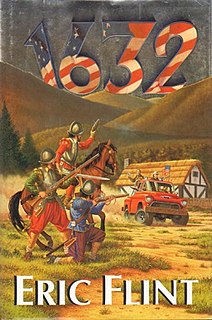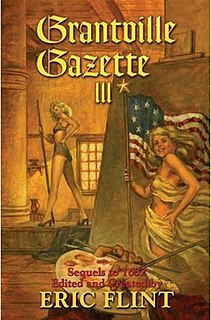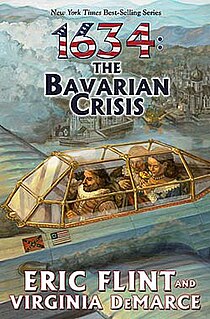
1632 is the initial novel in the best-selling alternate history book series, "1632", written by American historian, writer, and editor Eric Flint and published in February 2000.

The Grantville Gazette is the first of a series of professionally selected and edited paid fan fiction anthologies set within the 1632 series inspired by Eric Flint's novel 1632. The electronically published the Grantville Gazettes, which are reaching long novel length with regularity, now make up the majority of the series in terms of words in print. Flint as series owner and editor accounts all as canonical. The Science Fiction Writers of America (SFWA) recognizes published stories within the Gazettes as qualified credentials for membership—which membership requires a writer to have three published works as prerequisites.

The 1632 series, also known as the 1632-verse or Ring of Fire series, is an alternate history book series and sub-series created, primarily co-written, and coordinated by American author Eric Flint and published by Baen Books.

Ring of Fire is the third published book by editor-author-historian Eric Flint of the 1632 series, an alternate history series begun in the novel 1632. The Ring of Fire is both descriptive of the cosmic event as experienced by the series' characters, but also is at times used as the name for the series itself. The series is set in war-torn Europe during the middle of the Thirty Years' War.

1633 is an alternate history novel co-written by American authors Eric Flint and David Weber published in 2002, and sequel to 1632 in the 1632 series. 1633 is the second major novel in the series and together with the anthology Ring of Fire, the two sequels begin the series hallmarks of being a shared universe with collaborative writing being very common, as well as one that, far more unusually, mixes many canonical anthologies with its works of novel length. That is because Flint wrote 1632 as a stand-alone novel, though with enough "story hooks" for an eventual sequel, and because Flint feels "history is messy" and the books reflect that real life is not a smooth, polished linear narrative flow from the pen of some historian but is instead clumps of semi-related or unrelated happenings that somehow sum up how different people act in their own self-interests.

1634: The Ram Rebellion is the seventh published work in the 1632 alternate history book series, and is the third work to establish what is best considered as a "main plot line or thread" of historical speculative focus that are loosely organized and classified geographically. The initial main thread is called the "Western and North-Central Europe thread" ; the second plot line, encompassing events in Italy, Spain, the Mediterranean region, and France, the "South European thread", and this book can be considered the starting novel of the "South-Central/South-East thread" being set in southern Germany, Austria, Bavaria, and Bohemia. This geographically organized plot thread actually began in Ring of Fire in Flint's novelette "The Wallenstein Gambit" which is set in Bohemia, Austria, and Germany, which tied into stories in various Grantville Gazettes.
The Grantville Gazettes are anthologies of short stories set in the 1632 universe introduced in Eric Flint's novel 1632 that was primarily published as a bi-monthly electronic magazine from 2003 until shortly after Flint's death in 2022.

Grantville Gazette II is the third collaborative anthology published in print set in the 1632-verse shared universe in what is best regarded as a canonical sub-series of the popular alternate history that began with the February 2000 publication of the hardcover novel 1632 by author-historian Eric Flint. Baen Books and Flint decline the distinction, counting this book as the sixth published work. Overall it is also the third anthology in printed publication in the atypical series, which consists of a mish-mash of main novels and anthologies produced under popular demand after publication of the initial novel, which was written as a stand-alone work.

1634: The Baltic War is a sequel to both the first-of-type sequels, Ring of Fire and 1633, co-written by American authors Eric Flint and David Weber published in 2007. It had to await schedule co-ordination by the two authors, which proved difficult and delayed the work by nearly two years. It continues theMain or Central European threadcentered on the newly organized United States of Europe birthed in Central Germany under the protection-by-arms of Emperor Gustavus Adolphus and in particular, the role of the citizens of Grantville, now of Thuringia, and the capital city of Magdeburg have to play on the world stage. With the stability imposed by the protection of Gustavus's armies, up-timers began migrating to other locales in the "neohistories" world as the year 1633 closed.

The Grantville Gazette III is the third collaborative and the fourth anthology in the 1632 series edited by the series creator, Eric Flint. It was published as an e-book by Baen Books in October 2004. It was released as a hardcover in January 2007, and trade paperback in June 2008 with both editions containing Flint's story "Postage Due".

1634: The Bavarian Crisis is a novel in the alternate history 1632 series, written by Virginia DeMarce and Eric Flint as sequel to Flint's novella "The Wallenstein Gambit"; several short stories by DeMarce in The Grantville Gazettes; 1634: The Ram Rebellion; and 1634: The Baltic War. The novel's first draft was completed in 2005, before work on The Baltic War began. Many chapters of that "early draft version" were available on line, but the final production reached print on October 1, 2007.

Ring of Fire II is a 2008 anthology created by editor-author-historian Eric Flint. It is the second anthology in the 1632 series following after Ring of Fire (2004).
The Assiti Shards series is a fictional universe invented by American author Eric Flint. It is a shared universe concerning several alternate history worlds, related to a prime timeline. The defining characteristic of the fictional universe is the existence of the "Assiti Shards effect", and the impact that strikes by Assiti Shards have on characters in the stories. The series is rather large and expansive, having started publication in 2000, and as of 2008, consisting of 15 print books, and 21 e-magazine anthologies, in two different published timelines of the same multiverse.

1635: The Tangled Web is a novel in the alternate history 1632 series, written by Virginia DeMarce.

1636: The Saxon Uprising is an alternate history novel by Eric Flint in the 1632 series, first published in hardcover by Baen Books on March 29, 2011, with a paperback edition following from the same publisher in March 2012. It is a direct continuation of 1635: The Eastern Front. The threads mentioned in this novel are taken up in 1637: The Polish Maelstrom.

1635: The Eastern Front is an alternate history novel by Eric Flint in the 1632 series, first published in hardcover by Baen Books on October 5, 2010, with a paperback edition following from the same publisher in November 2011. It is a sequel to 1635: The Tangled Web and is directly continued by 1636: The Saxon Uprising.

1636: The Kremlin Games is a novel in the 1632 series written by Gorg Huff and Paula Goodlett along with Eric Flint. It is the fourth book in the series to be listed on the New York Times bestseller list for hardcover fiction. This book reached number 30 on the NY Times list during a single week in June 2012. Besides being listed on the NY Times Best Seller list, 1636: The Kremlin Games was also listed on the Locus Hardcovers Bestsellers List for the month of September in 2012 at number 6.

1636: The Devil's Opera is a stand-alone novel in the alternative history 1632 series with minor character overlaps. Published on October 1, 2013 the book is written by David Carrico and Eric Flint. It is a semi-detective novel set in a growing industrial city that is a continuation of two series of stories that David Carrico had originally written in the electronic versions of the Grantville Gazette that were serialized over several issues and later compiled into the compilation 1635: Music and Murder, one series involving criminal investigation and crime fighting and other series involving music and social revolution.

1636: Commander Cantrell in the West Indies is a novel in the 1632 series written by Eric Flint and Charles E. Gannon and published on June 3, 2014.
This is complete list of works by American science fiction and historical fiction author Eric Flint.
















